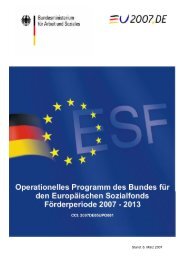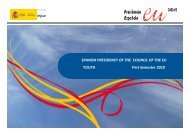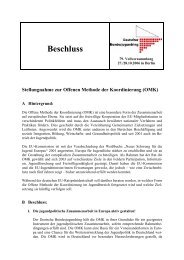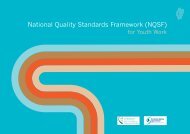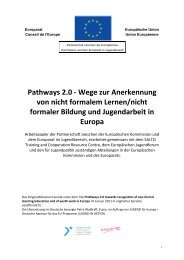Report - Salto
Report - Salto
Report - Salto
You also want an ePaper? Increase the reach of your titles
YUMPU automatically turns print PDFs into web optimized ePapers that Google loves.
44<br />
Bridges for Recognition | Terms and Concepts - What do we mean when we say…<br />
Summative evaluation or assessment refers to assembling a picture of the outcomes of<br />
an activity in relation to the aims and purposes with which it began and/or in relation to<br />
a set of performance criteria that apply to all comparable activities. This kind of evaluation<br />
or assessment places the primary accent on comparing the starting and ending points of a<br />
process, but is less concerned with what happened along the way.<br />
Standards and quality standards are terms that can be used in several different ways. To<br />
say that an organisation uses standard methods of youth work might simply mean that it uses<br />
what the commentator judges to be the usual methods, that is, those used most commonly.<br />
The comment might well also convey the judgement that the methods in question are those<br />
generally recognised in the youth sector to be appropriate. This carries the suggestion that<br />
standard methods reflect professional norms, that is, they are seen to be good and valuable<br />
methods. At this point the term standards takes on a distinctive flavour, because it introduces<br />
the idea that some youth work methods are better than others (depending, of course, to some<br />
extent on the purpose and the participants). This raises the question of the bases for such<br />
quality judgements, which take the form of criteria, that is, attributes that should be present<br />
(or not present in some instances) if a particular youth work activity and its methods are to be<br />
seen as of good quality. The criteria that are applied are not necessarily the same for all cases,<br />
although some criteria may apply in all cases.<br />
Criterion referencing means to assess the type and level of service, experience or outcomes<br />
of youth work/education on the basis of a set of criteria external to the event, activity or<br />
achievement in question.<br />
Normative referencing means to assess the type and level of service, experience or outcomes<br />
of youth work/education on the basis of the performance of all participants relative to each<br />
other.<br />
Learning outcomes are the results of a learning process, which may be expressed in a variety<br />
of ways. In fact, the outcomes that are recorded and measured at any one point in time are<br />
interim moments in a learning process, that is, a snapshot frame in a film (which could also<br />
run backwards).



